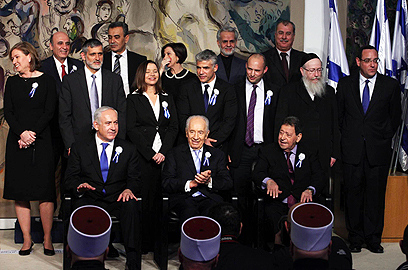

At a ceremony 671 days ago, 48 new members of the Knesset were sworn in - a record number of freshman legislators to take office at one time. They joined 72 veteran MKs in vowing to promote a diplomatic process, reduce the cost of living, work on the housing crisis and serve the public in matters of religion and state.
But on Monday, the 120 legislators entered the Knesset for the last time this term, and - failing a dramatic event - will approve its own dissolution and go into recess ahead of the elections next March. Some lawmakers saw this as a last chance to push through legislation, either in a first reading so that it remains on the agenda of the next incarnation of parliament, or even to see it through to full passage by the pleum.
The coalition that gave rise to this Knesset, whose early days were marked by the screaming of its members, could not even last half of its term. If the religious faction does make good on its vow not to save Netanyahu from elections, and the Israel Beiteinu stands by its commitment that it will not allow an alternative coalition, the bill to dissolve the Knesset will pass its second and third reading, and the citizens of Israel will be forced to cool their heels until March 17, when they will go to the polls.
For long months, the coalition that finally disintegrated last week tried to leap the many pitfalls in its way. Almost every major issue drew heavy fire from both sides. The coalition took on the role of the parliamentary opposition itself – it leveled the harshest criticism and harsh, it thwarted the bills of its own members and stuck down reforms as a way of settling personal accounts.
As the days passed, the crises grew and the lack of trust between the coalition partners increased. About a month ago, the so-called nationality bill led to an uproar, followed by disagreements on the budget and the Economic Arrangements Law - in particular Yair Lapid's zero-VAT bill. This initially had the support of Prime Minister Benjamin Netanyahu, who retracted his backing just before the completion of the legislation, and sentenced the political system to elections. The dismissal of Justice Minister Tzipi Livni and Finance Minister Lapid left no other option. Israel was on the way to the polls.
This is one of the only election cycles about which none of the members of the coalition can explain how we got here and why now. How had Netanyahu undergone such a reversal of opinion on Lapid and Livni, compared to how he viewed them just a few months ago?
Rushed legislation
On this last voting day, the Knesset House Committee headed by MK Yariv Levin of Likud was to meet to approve several issues on the agenda – one of which being the 2nd and 3rdreading of the law to disband the Knesset.
At 4pm local time, Knesset Speaker Yuli Edelstein was to open the plenum for what will most likely be the last time, and the MKs will attempt to "clear the table" and finish pressing legislation processes before the recess.
At the end of the day, a full mobilization of all members will be required to enter the plenum and the proposition to disband the Knesset will be raised and most likely passed.
The vote will officially ring in election season, and a series of promises that were still on the agenda will be postponed for six months at best; at worst, they will no longer be implemented.
The Prevention of Infiltration bill, which had not been expected to reach its final reading has been passed, meanwhile, but Yair Lapid's zero-VAT bill will likely end up collecting dust on a desk inside the Finance Committee. A series of legislation regarding religion and state, various reforms aimed to lower the cost of living, the fair rent bill, and the contentious nationality bill that enflamed the entire political spectrum will also probably all never see the light of day.
On Tuesday, MKs will turn their attention to internal matters in the form of the Likud primaries (that could take place by the end of the month), Labor primaries (to take place in the first or second week of January), and for the rest of the factions, party chairmen will embark on a fundraising journey and at the end will compile a list – both attractive and diverse of course – for the next Knesset.

















